Ian Nepomniachtchi delivered a stunning blow as Black to World No 2 Ding Liren, while Fabiano Caruana scored against compatriot Hikaru Nakamura
Fabiano Caruana and Ian Nepomniachtchi are in the lead after the first round of the Candidates, followed by Jan-Krzysztof Duda, Richard Rapport, Teimour Radjabov and Alireza Firouzja, who drew their games, while Hikaru Nakamura and Ding Liren start the tournament with a zero on the scoresheet.
The first round of the 2022 Candidates brought excitement as the players in all four games came out swinging.
The first game to finish was between the winner of the previous Candidates cycle Ian Nepomniachtchi and the world’s second highest-rated player, Ding Liren. In an exciting game, Nepomniachtchi managed to mount a crushing attack on the white king, forcing the Chinese player to surrender in just 32 moves.
The American duel between the four-time Candidates participant Fabiano Caruana and top chess streamer Hikaru Nakamura ended with a victory for White. Despite being surprised in the opening, Nakamura managed to hold his position. In the end, however, it was a one-sided game where it was only a question of when and not if Caruana would win.

Similarly to Nakamura, Hungarian Richard Rapport was surprised in the opening as Black against the rising Polish superstar Jan-Krzysztof Duda. Despite the early advantage from the opening, Duda couldn’t find the right path forward, allowing Rapport to gradually consolidate and bring the game to a draw.
The duel between the oldest and the youngest participants of the Candidates – Teimour Radjabov (35) and Alireza Firouzja (18) – ended in a draw despite promising to bring the most excitement to the day. Firouzja made a stunning sacrifice of material in the middlegame, threatening to completely throw white pieces into disorder. However, he lost the momentum, and Radjabov’s experience was enough to tame the immense energy of the young Alireza Firouzja.
Here follows a deeper look at the games from the first round of the 2022 Candidates tournament.
Jan-Krzysztof Duda vs Richard Rapport: A surprise met with endurance
With two victories, two draws and a loss in the games with classical time control, Duda had a slight advantage over his opponent, at least when considering their previous encounters.
This game brought surprises from move one when Duda played 1.e4. In all their previous games, Duda went for 1.d4 against Rapport. Given that the Hungarian plays various responses to 1.e4, this suggests that Duda has studied Rapport very deeply.

Rapport opted for a Sicilian, to which Duda reacted with a new trendy 5.Bf4 line. It immediately seemed that Rapport was caught on the back foot – spending a lot of time thinking about the opening moves. No wonder Rapport made a serious inaccuracy as early as on the move eight with 8…g6.
Duda responded with an energetic pawn-thrust c4-c5 that ruined Black’s pawn structure and grabbed the initiative, leaving Rapport thinking for a long time in a sharp unknown position.
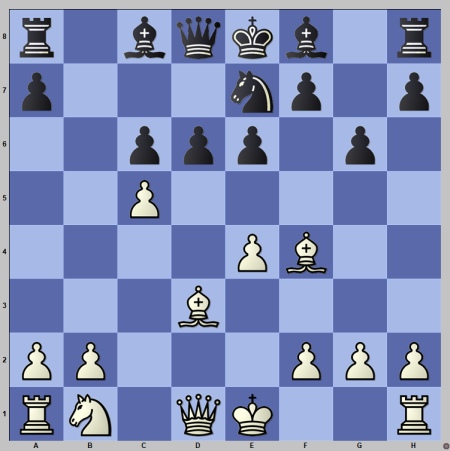
There was no doubt that the Hungarian wasn’t comfortable with the developments.
Following exchanges of heavy pieces down the central files, it was Duda’s time to err. Fearing for his a2-pawn, he naturally recaptured with bishop 16.Bxd1, but that gave Rapport a couple of tempi to complete development. In hindsight, 16.Rxd1, sacrificing a pawn, looks much more menacing for Black.
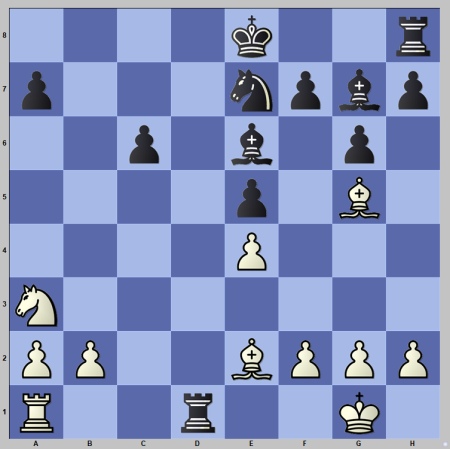
It seemed that inspiration had passed from Duda to Rapport, who was defending with great precision but only up to a certain point.
The last critical moment of the game came on move 33. After nearly equalizing, Rapport made a couple of inaccuracies and found himself again in big trouble. However, instead of 33.a4! – creating a permanent weakness on a5 in Black’s camp – Jan-Krzysztof went for the a5-pawn immediately, which wasn’t nearly as dangerous for Rapport.
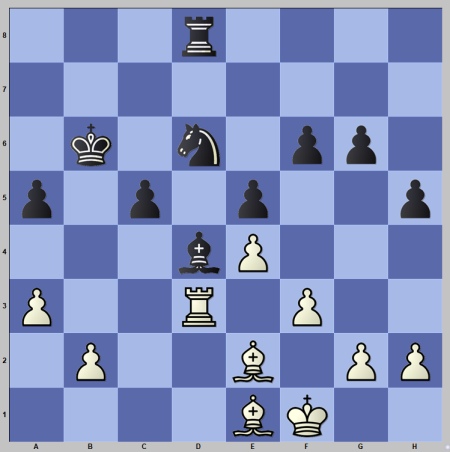
After almost 40 movies, White created a runner on the a-file and had an active pair of bishops, but Black was just in time to control everything and hold his position. The game dragged on, but it was even – with Black preventing White from making any progress on the queenside. After 69 moves and six hours of play, the two opponents agreed on a draw.
Rapport is definitely the one who is more satisfied with the outcome, having made a comeback following a weak opening position.
Ding Liren vs Ian Nepomniachtchi: The former Challenger delivers
Ian Nepomniachtchi, playing with black pieces, delivered a crushing blow to World No 2, Ding Liren, in just 32 moves. It was the first game to finish in the first round.
Unlike Nepomniachtchi, who has a recent world championship match experience and has played in other tournaments, Ding Liren hasn’t played in a top-level event for a while. He only qualified for the Candidates at the last moment, after a tournament marathon in China. However, Ding did beat Nepomniachtchi in the last game of the previous Candidates cycle, and he did have the advantage of the white pieces.

A rare line of English opening with early 2.g3 and 2…c6 was played. Black’s goal was to build a strong presence in the centre, while White aimed to stop this. The focus of both sides was Black’s advanced e4-pawn, which is key for the whole position: if White wins it, he’ll gain a big advantage; If Black holds it, he’s good.
The first critical moment of the game was on the move 14. White spent 20 minutes thinking before playing 14.h4. Previously opting to pursue development on the queenside, White needed to make sure he put a solid defence line against Black’s threats on the kingside. But it seemed as if that wasn’t enough.
Contrary to the opening theory, Ding refused to take the e4 pawn from Black and instead focused on development. Nepomniachtchi used his stronghold on e4 to build up the initiative and launched a dangerous attack on the kingside threatening with g7-g5, which was highly unpleasant for White.
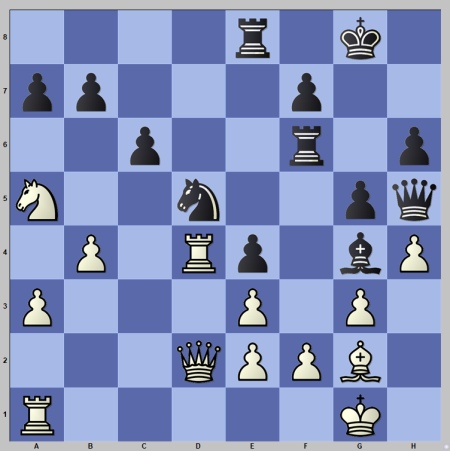
After 25…g5! Black launched a deadly attack on White’s king
Ding was trying to find the best way to save himself from Nepo’s threats but to no avail. 27.Nxb7 was the last straw as black pieces quickly pounced at White’s king.
With his face buried in his hands, Ding made a desperate attempt with 30.f4, but the position was hopeless. Two moves down the road, and after three and a half hours of play, White resigned in the face of an imminent checkmate.
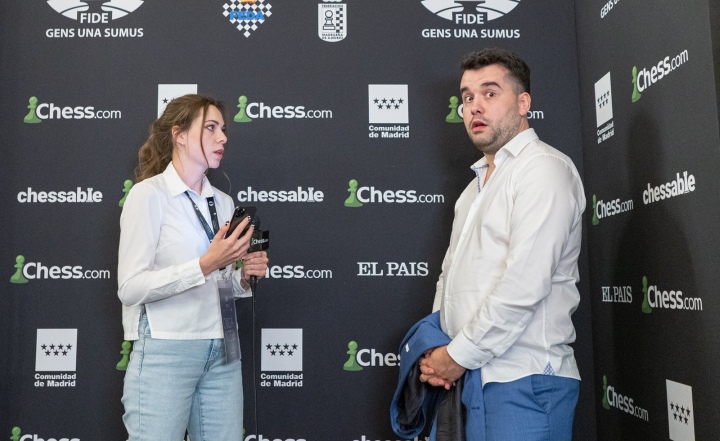
Fabiano Caruana vs Hikaru Nakamura: An American duel
The first round of the Candidates saw the two Americans playing against one another. This was deliberate, following the implementation of compulsory pairings, which aims to prevent potential collusion between players from the same country in the later rounds.
The four-time participant of the Candidates, a former challenger and the only player ever not to lose a single classical game in a World Championship match against Carlsen, Fabiano Caruana is widely seen as a tournament favourite. He has played against Nakamura 45 times with classical time control and has won all the recent games in which he was White. So, the odds seemed to be strongly in his favour before the game. It was therefore expected he would start aggressively against Nakamura.

In the Ruy Lopez – a befitting opening for a game played in the Spanish capital – Nakamura responded with the Berlin. Caruana avoided a threadbare endgame by defending his e4-pawn with d2-d3. As in the case of Rapport against Duda – Nakamura burnt a lot of time in the opening, spending 12 minutes thinking about his response as early as move eight. Caruana, on the other hand, responded instantly, suggesting he was very well prepared for the opening position.
Nakamura played logical moves, advanced his kingside pawns and reached a roughly equal but unbalanced position. Strange as it may sound, Nakamura’s decision to evacuate his king to the kingside was his first inaccuracy.
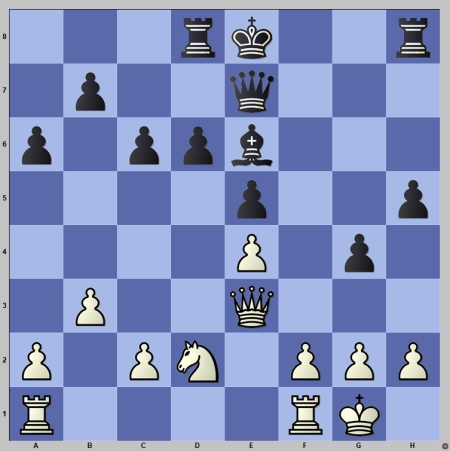
Before Black’s 21…0-0. The alternative that Caruana did not like as much was 21…Kd7 evacuating the king to the queenside
Caruana focused on playing in the centre, sieging Black’s central pawns and gradually infiltrating into Nakamura’s overextended line of defence.
By move 32, it was an uphill battle for Nakamura – where White had all the chances, and Black had to be skilful and hope for a miracle.
Caruana pushed – Nakamura defended. All the time, White was better, but Nakamura’s moves were saying: “prove it!” Caruana’s patience meant that he was now the one who spent more time thinking, so the time advantage passed on to Black.
But this was not enough in the end, as Fabiano played with great precision and never gave Nakamura a chance. After nearly five and a half hours of play – the American duel ended with a big victory for Fabiano Caruana.
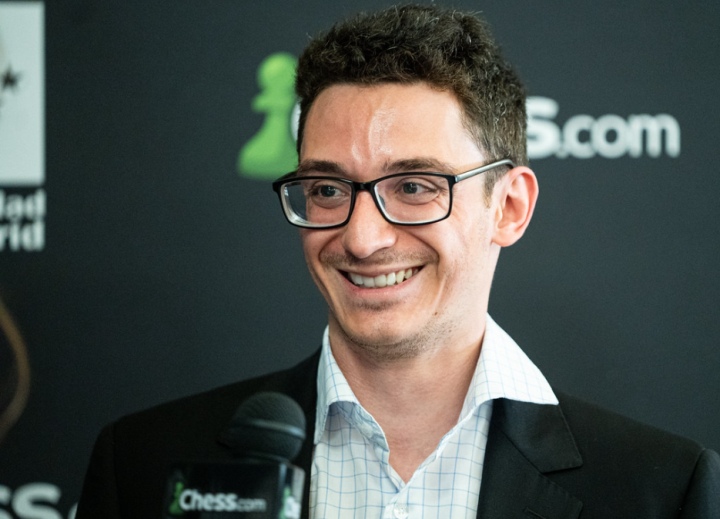
Teimour Radjabov vs Alireza Firouzja: Experience and age
In one of the liveliest games of the round, the drama in the middlegame transpired into a dull rook endgame before Teimour Radjabov (35) and Alireza Firouzja (18) agreed to split a point. But this was no ordinary encounter: it was a duel between the oldest and the youngest participants in the Candidates, and both players were determined to shine on the first day of the event.
In the Queen’s Gambit Accepted, Firouzja opted for a popular sharp line in which Black holds on the c4-pawn, but White gets some pressure on the centre. It was a risky choice by Firouzja, especially as this was the first game of the Candidates. The young Frenchman was going for a very concrete, sharp, dynamic position.

Before the Candidates, Firouzja said he wasn’t nervous about this tournament and it seemed he wanted to show it from the first round. Since move one, Radjabov was much slower on the clock and under pressure. It was as if the youngest player of the Candidates wanted to show to his opponent – and the world – that he had a strong grip on his nerves and that he meant business in Madrid.
White regained the pawn and retained some space advantage, but Firouzja sacrificed an exchange and got two bishops and dangerous pressure along the white squares, particularly the h1-a8 diagonal, as compensation.
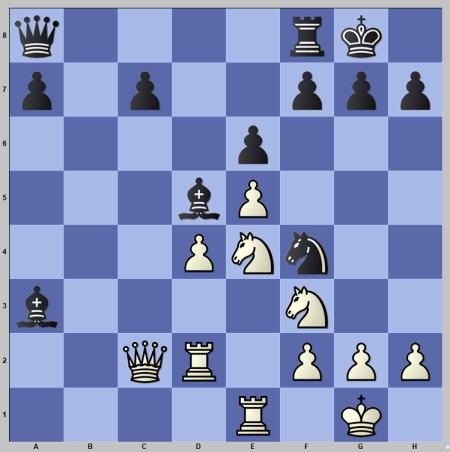
However, at this stage, Firouzja started spending a lot of time thinking. His hour-long advantage by this point melted down to just six minutes. Radjabov, on the other hand, found a nice setup for his knights and engineered a sort of an attack on the black king’s fortress.
White returned the exchange at his convenience, achieving a better position. It was Firouzja now who was playing catch up. Radjabov, however, wasn’t able to find the best way forward and – after exchanges in the centre – the two ended in an even rook endgame, although Black was a pawn down.
After reaching the first time control, the two continued to play a rook endgame with a two-vs-one pawn on one side, but it was even. Still, the opponents tested each other for nearly two more hours before agreeing to split a point on the move 71.
The second round of the Candidates starts on Saturday, 18th June at 3 PM CEST at the Palacio de Santona in Madrid.
The pairings of the second round are as follows:
Richard Rapport vs Alireza Firouzja
Hikaru Nakamura vs Teimour Radjabov
Ian Nepomniachtchi vs Fabiano Caruana
Jan-Krzysztof Duda vs Ding Liren
For more information please visit official website: https://candidates.fide.com/
Text: Milan Dinic
Photos: FIDE / Stev Bonhage
2022 Candidates Tournament Partners:

